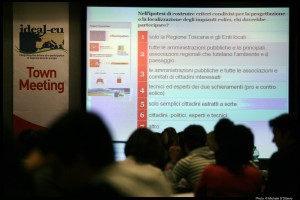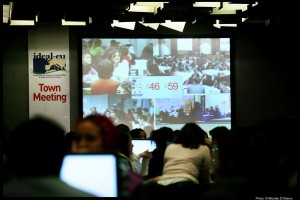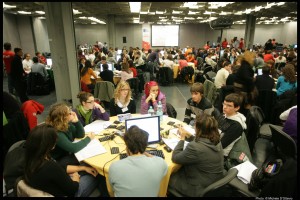A huge success for the first pan-European town meeting on climate change
17. November 2008 – 19:28 by Francesco MolinariOn 15th November 2008, the first pan-European town meeting on climate change took place simultaneously in the three venues of Florence (Italy), Cornellà de Llobregat (Barcelona, Spain) and Poitiers (France), in the context of the IDEAL-EU project, one of the ongoing Preparatory Actions on eParticipation funded by the European Commission.
Some 470 youngsters from the three European Regions of Tuscany, Catalonia and Poitou Charentes, engaged for a full day in three sessions of debate, each ended by a voting session, touching upon several key topics of potential interest to the Special Committee appointed by the European Parliament in order to update the EU policy agenda on climate change. In the next few days, the town meeting results will be handed out to the Committee Chairman, MEP Guido Sacconi, who also introduced the Florence discussion.
For those who don’t know about it, a town meeting is a tool of deliberative democracy practised in the US region of New England since colonial times, when an entire community was invited by local government officials to gather in a public place and formulate suggestions or provide feedback on policy actions. In its modern version - the electronic town meeting - the debate is guided and managed thanks to the decisive support of ICTs. These allow a rapid storage, transmission and sharing of discussion results across several assemblies, even remotely located, as well as the expression of individual participants’ opinions through a specially devised polling system.
It should be stressed that the aim of the town meeting is not to seek an agreement at all costs, but to elicit different views and interpretations, allowing a comparison among a richer and broader range of opinions. This is why the debates are not moderated, but only facilitated, by domain experts, having the only task of ensuring that sufficient information is provided to participants before the discussion and deliberation takes place.
In the IDEAL-EU project case, the key questions answered by the three regional communities - mostly composed by students aged 14-19 - simultaneously in their respective languages, have been the following:
- How can Europe reduce its use of fossil fuels?
- Why renewable energies are currently not widespread?
- What measures would be effective in reducing CO2 emissions?
- How can we reduce the consumption of energy?
- What could we change of our daily habits?
- What’s wrong with the current model of socio-economic development?
The most relevant, interesting and effective proposals emerged from this brainstorming phase were also submitted to an electronic vote, simultaneously in the three venues, so as to consolidate the results and make them as informative as possible for the public decision makers. For instance, 63% of the Catalan, 59% of the French and 50% of the Italians expressed themselves against nuclear power plants.
Two experimental “virtual tables”, formed by 3 to 4 e-users located all over Europe, also joined the debate and the polling sessions.
In the final part of the day, three topics of regional relevance were independently examined, namely:
- how to make wind power plant installations compatible with landscape integrity in the Tuscany Region;
- what is the best way to convert waste into resources in the Catalonia Region;
- under which conditions can we improve the use of public transport for personal mobility in the Region of Poitou-Charentes.
The whole event was broadcasted live by the web streaming service of the Tuscany Region.
Following are a few pictures by Michele D’Ottavio (https://www.micheledottavio.com).







1 Trackback(s)